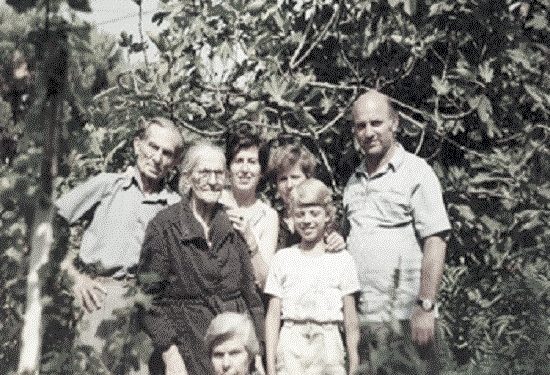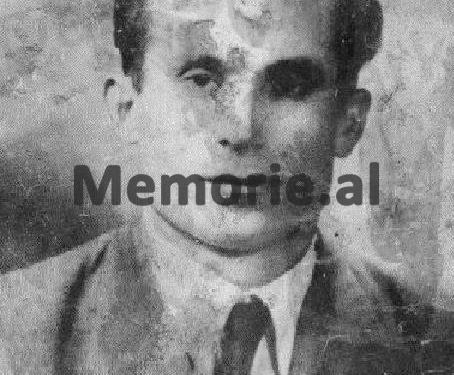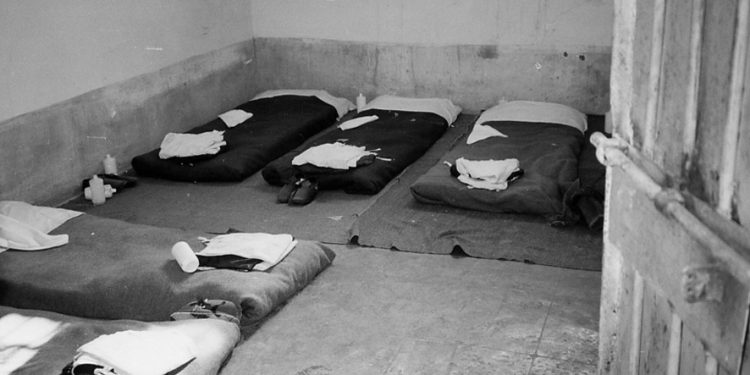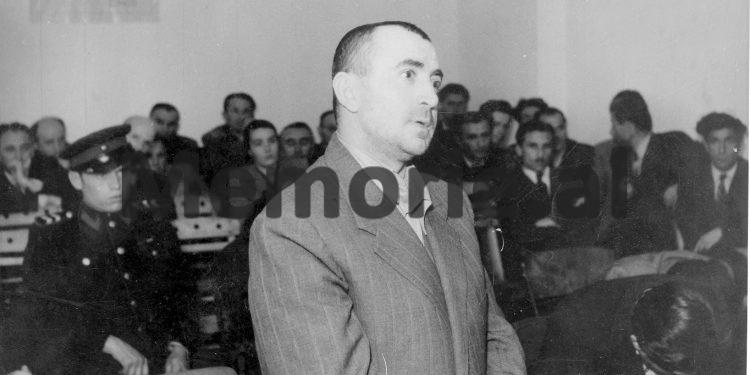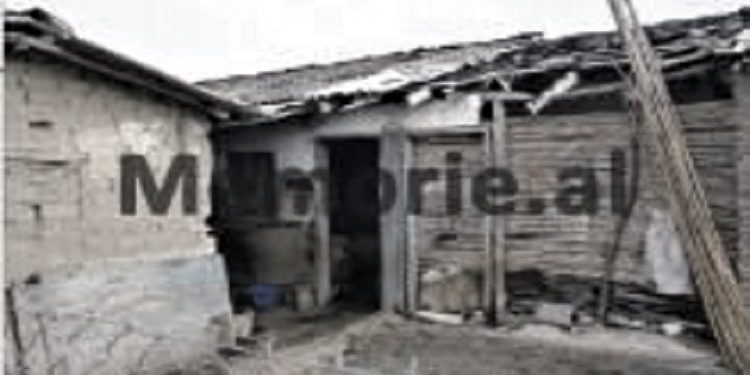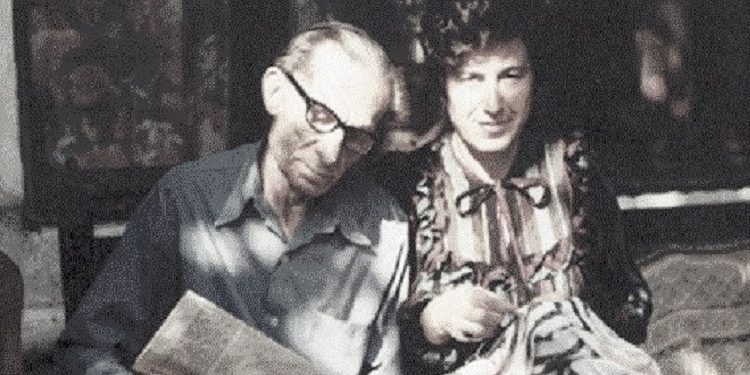By Gjergj Titani
Memorie.al / In the first three parts of this interview, published in previous issues, Assembly, the only daughter of Pandi Kristos, told about her early youth full of contempt and insults from her friends and about the disgust of to the leaders of the Committee of the Union of the Labor Youth of Albania in the capital. The meetings with her father in prison and the deportation of her family from Tirana to Lushnja. The gloomy life of the family of the former close friend of Enver Hoxha and the hard work they did during the exile, in the Agricultural Farm of Çerma. The monstrous behavior of the powerful State Security and others. How Enver sent a letter to Nexhmije Hoxha, to continue his higher studies and the reactions after this letter, which added even more to the family’s misfortunes. And in the second part published in the previous issue, Mrs. Assembly Kristo Vullkani, with her interview, introduced us to the vicissitudes of the family, after the imprisonment of her father, Pandi Kristo, and the great help given by her uncle, (Pandi’s brother), Koço Kristo, who as a second parent took care of his brother’s family and together with them, often went to the Burrel prison to meet Pandi, also sending them bags of food, which he carried on his back, since no car would accept to take them they, as they knew they were going to Burrell prison. Likewise, in the second part of the interview with Mrs. Assembly Kristo, she also told us about the many vicissitudes of her family during the time when they were in exile in the Çerma sector, with the Operative Workers of the State Security who encouraged the lives of the internees, using all kinds of machinations and intrigues, as well as the doctors from Lushnjara, who were very humane with her mother, curing her themselves, or sending her by ambulance for treatment in Tirana, etc.
Continues from last issue
Madam Assembly, somewhere, in a previous interview, the story of your name was mentioned, but since it was told by a third party, there may have been mistakes…! How is the truth?
I read it when it was mentioned and, actually yes, there were some inaccuracies. The essence is the same, that Enver Hoxha decided my name, but in slightly different circumstances from those that have been written. As my father told me, on the third day of my birth, when the child’s name was given according to some customs of the country we came from, Enver Hoxha and Koçi Xoxen came to congratulate him at home. On this occasion, that is, for naming, my grandmother had also made a typical dessert, which they make in Korça, for such joys.
Since Enver knew what that dessert was used for, he asked “how did you name it?” The father told him that they had not found him yet. Mine was not in good health after my birth and they didn’t think anything of it. “Well, since it is so, you will name it Assembly” – said Enveri. The People’s Assembly continued to be called the Assembly then. None of the family members liked it, especially the grandmother, who regretted serving that dessert, but of course, no one could object.
In what year were you born?
In 1945.
Good name they gave you, but at least your father’s “golden” time would have lasted a few more years. He was arrested in 1947, right?
Three years after my birth. The signals may have been visible as early as ’47, but he was imprisoned in ’48.
After the breakdown of the relationship with Yugoslavia…?
Yes, this was also the motive that I don’t believe came directly from Enver Hoxha, but from Russia. But, since he was afraid that measures could be taken against him, he arranged the affairs so that the burden fell on others. At that time, my father was the chairman of the State Control Commission, so he was not politically involved, as other members of the Political Bureau could be. He did not even expect that he could be punished. One day, Spiro Koleka comes looking for him, and tells him to ask the Russian ambassador for a meeting, to clarify some conversations you had with Koçi Xoxen. The idea was that these two were Yugoslav spies.
The truth is that Enveri attacked precisely these first ones, because he wanted to eliminate the Communist Group of Korca first, so that he could remain himself. As he actually did. Sotir Vullkani, one of the father’s friends, the one who gave him the skills and included him in the party, was not punished immediately after this incident. When he met Enver, he told him later; Kristo and Xoxe did not make state policy, if it is to be changed, let the entire Bureau be changed. He did not accept these words and took measures against him too, but later. I remember saying to my father, when he got out of prison: “Why didn’t you run away, why didn’t you escape”?! “If we did it, he said, we would confirm what they accused us of, that we were really collaborators of the Yugoslavs.”
You were very young, but do you remember anything from your father’s imprisonment? Where did they take him?
First, they took him to the old prison of Tirana, where he is today, to “Mine Peza”. After that, they took him to Burrel, brought him back and left him for 7 years in Tirana, then again in Burrel. So by the time he was here, I was 3 to 10 years old. I have memories, yes, because back then, food was allowed to be brought to him every day. When my grandmother would come from Korça to cook it, I would go and bring it to her. To meet him, he was allowed only once a week, but he could leave food every day. At the meeting place, there were two iron bars and an officer watching. If he shot well, he even allowed me to hug him, but even these were moments of fear for me.
Why? What did you think?
It seemed to me that if I stayed close to him, if he hugged me and held me there, I would not be allowed to return to mine again. You can’t even imagine this feeling in the prison premises, I was very small.
Meanwhile, how did you live? Where?
My mother and I lived with my uncle and aunt, at their house, somewhere at the end of “Kavaja Street”, which at that time was considered the end of the city.
Where did you live before?
In a yard with Enver Hoxha. I even went and saw it later. It was adjacent to his villa and it was supposed to be behind Hysni Kapo’s, but our yard, with his, was one.
What did your father tell you about his time in prison?
He was not a man who talked a lot, he never said a lot. He told small episodes, for example, when they were taken by truck from Tirana to Burrel, he was with Musine Kokalari and others.
Why did they make these movements, what did it say?
At the time of the transfer from Tirana, there was the Tirana Conference, where Bedri Spahiu arose and asked for the rehabilitation of the figure of Koçi Xoxes and Pandi Kristos. After him, other voices were raised, which fell on Enver, and which were normally condemned.
However, your father somehow escaped, unlike Xoxe…?
He told me that, in the early days, for 6 months, they stayed in some villas, I don’t know where, in separate rooms, even food was taken to them from Hotel Dajti, and apparently they were still waiting for instructions from Moscow, to act as follows. But even then in the cell, without the final sentence being given, the guard who stayed in his cell told him “come out, you escaped”, he had heard that only one would be shot.
What about Xoxen, had they had more opportunities to communicate?
Except through a hole in the dungeon wall, where he had sent her a little letter, just to tell her he was next to her, no. In the trials that were held, they were seen from a distance, but the father knew that Koçi had prepared his defense arguments against the accusations that would be made against him, but that he was never allowed to tell them. It didn’t even occur to him that he could be shot, but as soon as he smelled it, he cut his veins. After his suicide attempt, he was also put in a cell by an officer, and any potentially dangerous equipment was removed.
Did you go to Burrel to meet him?
I went, yes. I used to go with my uncle, even then I was little. I remember that we brought him sacks of coal, potatoes or onions, because he had to cook. There are some funny scenes now, because the uncle, so tired as he was from lifting the sacks on his arm, it seemed as if his head would be torn off, and I, who did not have his trouble, but suffered with myself the fact that I would not have with whom to return to Tirana. The wait to meet him in Burrel was terrible; we had to wait for hours, in the rain and snow, to meet him. So much so that later, the prisoners’ families made a hut to at least protect them from the rain and the cold. There, during the meetings, the convicts were divided into groups; the political convicts separately, the thieves separately. The latter were more privileged than the “enemies of the people”.
How many years did this situation last?
Until they took him out of prison, in 1963, when we were then transferred to Lushnja, when I had just finished high school and I was not given the right to go to high school.
With the state it was in, I don’t even believe you would claim it…?!
Actually, I had a hope, no matter how much my father told me to give up. But 1963 was not a time of severe class struggle. Moreover, I was aware that some of my friends, also with imprisoned family members, had managed to win it. In fact, a year before me, Tuk Jakov’s daughter, who had been shot, had received the right to study, even though things went even worse for her later. They prevented her from marrying the man she loved and she had an even worse course of life, because she could never accept this. Anyway… in that case, there was hope, even though my father told me: “I got out of prison alive, they don’t give me the right to study. They gave it to her, only because they killed her father”!
Since they took you to the city of Lushnja and not to other areas known for deportations in this country, I wonder if they did not treat you badly…?!
No, and in fact I always say this to everyone I meet. I hear complaints, rightfully so, endlessly, but we don’t. Apart from the residents of Lushnja who were respectful and behaved very well, even when there was a need for other services such as hospital services, we always had doctors ready. So much so that I was surprised when a doctor told me to go home without worrying, if mom or dad had traffic during the night, I come home and see them. But even this did not last until the end.
Why what else happened?
After the death of Mehmet Shehu, they transferred us to Çerma, because they thought that until that time Mehmet had supported us with Kadri Hazbi to have a better life than the other deportees. In fact, it was often heard from different people: “Why are you keeping Pandi there”?!
Meanwhile, what were you doing? Or like all the workers of Çerma…?
That’s where I ended up, especially after Enver Hoxha’s oath that I had to work with a pickaxe all my life.
Why did you swear? What happened?
And I with my mind, one of the times when I went to my aunt in Tirana, I made a letter, which I sent to both Mehmet and Enver. I wrote to him about the history of the communist family and because we had ended up like this. If not school, at least I would have the opportunity to do a course, to deal with something different from manual workers.
Did you consult your father before starting the letter?
No, if I did, he wouldn’t have let me.
So I asked… how did they react after the letter?
I didn’t get any answer, but again my aunt gave the signal not to make a sound. She worked in ophthalmology, where Enver’s secretary, Vangjeli Sotiradhi, had gone to visit. She had saved my letter, to give it to him at a moment when he was in a good mood. Yes, before this moment arrived, Mehmet Shehu had gone to the office and told him “looks what letter Pandi Kristo’s daughter sent me, friend Enver”. He was angry, he had found out that the letter had gone to him and he said: “It was done, to tell me what I should do. If she wasn’t a girl, she would have gone to prison.” After that, they called me to the party committee and told me that; by the order of Comrade Enver, I would only work as a pickaxe worker.
Was Enver’s death a ray of light for you? How did the father comment?
I remember being told under my breath, before it happened. Apparently, how sick he was. I told my eti, but he told me that they might have said it as a provocation, so don’t make a sound, to anyone. In fact, it had not been like that, because shortly after, he died. On the day of death, we who were in the group of internees, lowered our heads, to hide the joy, in fact, because crying was out of the question.
Then things eased themselves…?!
Ramiz made things easier, yes; there was a spirit of change that started to give us hope.
In fact, the time has come, no Ramizi, but anyway, you had some time left there to think for so long…?!
Of course time brought change, we just followed the others. I met Ramiz, years later and introduced myself to him: I am Pandi Kristo’s daughter. Without saying another word, he immediately reacted angrily: “Well, those were my beliefs then.”
You created your family years later… from the last name you have today, it seems that it is a Korça family, the one that made your father part of the party…?
Yes, I married the son of Sotir Vulkani, Robert. We had known each other for many years before ’90, to meet again after 26 years, when he came out of prison. Even his family, as I told you, had the same fate. Memorie.al




